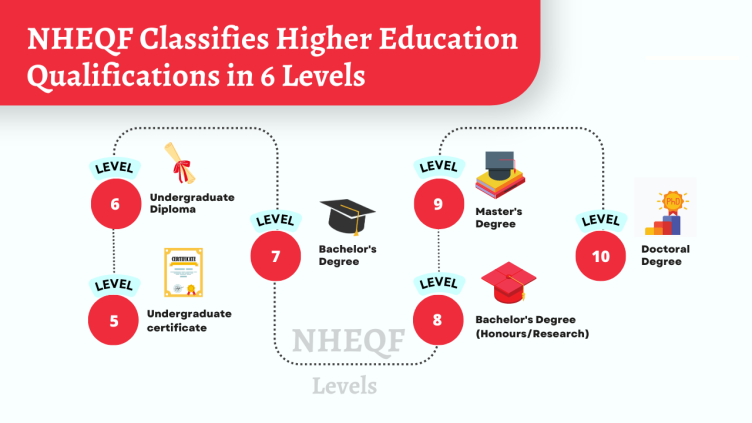UGC Enhances Comparability of Higher Education Qualifications with NHEQF
What are the NHEQF Levels?
The NHEQF offers an extensive framework for students to pursue diverse fields of study based on a set of performance criteria crafted in tandem with national as well as international standards. The 5 levels of qualifications under the NHEQF include:
Level 5
Level 5 offers a UG certificate to students after the successful completion of the 1st year, i.e., the first 2 semesters of a UG programme.
Level 6
Level 6 offers a UG Diploma after the completion of the first two years, i.e., the first four semesters of an undergraduate programme.
Level 7
Level 7 encompasses the first three years (i.e., the initial six semesters) of a four-year undergraduate program and leads to the award of a Bachelor's Degree.
Level 8
Level 8 includes 4 years, i.e., 8 semesters of a Bachelor’s Degree that offers graduates a Honours or Research specialization. Apart from this, Level 8 also constitutes one year, i.e., two semesters of a 2-year Master’s programme, offering a post-graduate diploma.
Level 9
Level 9 offers a Master’s Degree after two years, i.e. four semesters of studies after obtaining a Bachelor’s Degree. It also offers a Master’s Degree to students who complete one year, i.e., two semesters of studies after obtaining a Bachelor’s Degree with Honours/Research.
Level 10
A Doctoral degree/PhD is awarded to students after the successful completion of this level.
The implementation of the NHEQF will further be strengthened by Internal Quality Assurance Cells (IQACs) that would facilitate standardization across all HEIs, as directed by the UGC. With the establishment of NHEQF, Indian students will now be able to seamlessly transfer credits through the Academic Bank of Credit (ABC) and pursue their fields of study in diverse HEIs in India and abroad without compromising on their credits earned.
Overall, the NHEQF is here to revolutionize the Indian education system. Students will be empowered to apply theories and practices acquired in classrooms in the real world and locate inherent problems existing in society, thus contributing directly towards the growth of the nation.
